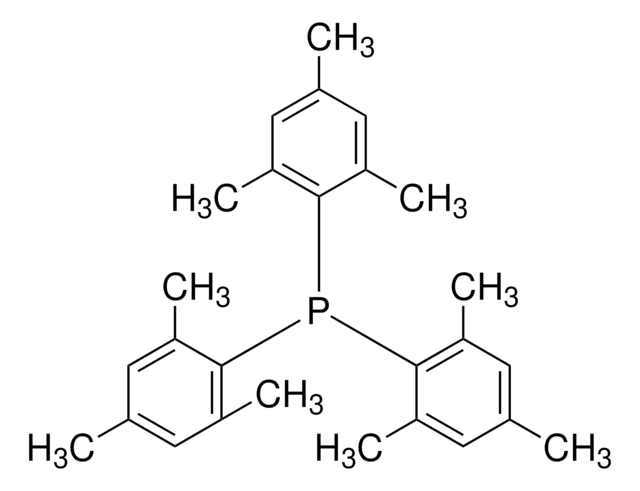775444
Tris(1-pyrrolidinyl)phosphine
97%
Synonym(s):
Tripyrrolidinophosphine, Tris(N-pyrrolidinyl)phosphine, Tris(pyrrolidino)phosphine, Phosphorous acid tripyrrolidide, Tris(N,N-tetramethylene)phosphorous acid triamide
About This Item
Recommended Products
Quality Level
Assay
97%
form
liquid
reaction suitability
reaction type: Buchwald-Hartwig Cross Coupling Reaction
reaction type: Heck Reaction
reaction type: Hiyama Coupling
reaction type: Negishi Coupling
reaction type: Sonogashira Coupling
reaction type: Stille Coupling
reaction type: Suzuki-Miyaura Coupling
reagent type: ligand
refractive index
n20/D 1.528
n20/D 1.53 (lit.)
bp
104 °C/0.1 mmHg (lit.)
density
1.041 at 25 °C
1.049 g/mL at 25 °C (lit.)
functional group
phosphine
SMILES string
C1CCN(C1)P(N2CCCC2)N3CCCC3
InChI
1S/C12H24N3P/c1-2-8-13(7-1)16(14-9-3-4-10-14)15-11-5-6-12-15/h1-12H2
InChI key
PXFLCAQHOZXYED-UHFFFAOYSA-N
Looking for similar products? Visit Product Comparison Guide
Application
Used as a phosphitylation reagent for oligonucleotide synthesis.
Storage Class Code
10 - Combustible liquids
WGK
WGK 3
Flash Point(F)
209.8 °F
Flash Point(C)
98.8 °C
Certificates of Analysis (COA)
Search for Certificates of Analysis (COA) by entering the products Lot/Batch Number. Lot and Batch Numbers can be found on a product’s label following the words ‘Lot’ or ‘Batch’.
Already Own This Product?
Find documentation for the products that you have recently purchased in the Document Library.
Customers Also Viewed
Our team of scientists has experience in all areas of research including Life Science, Material Science, Chemical Synthesis, Chromatography, Analytical and many others.
Contact Technical Service









